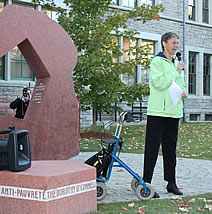Act Now

Empower U: Learn to Access Your Disability Rights Training on Canadian Human Rights, the Convention on the Rights of Persons with Disabilities (CRPD) and its Optional Protocol (OP) training aims to increase awareness of how to address discrimination using more familiar Canadian human rights laws such as Human Rights Codes and the newer international Convention on the Rights of Persons with Disabilities (CRPD). This is training for persons with disabilities by persons with disabilities. The training is part of a project funded by Employment and Social Development Canada and implemented by the Council of Canadians with Disabilities (CCD) in collaboration with Canadian Multicultural Disability Centre Inc. (CMDCI), Citizens With Disabilities – Ontario (CWDO), Manitoba League of Persons with Disabilities (MLPD) and National Educational Association of Disabled Students (NEADS). Read more.
Sign Up for our monthly digest
A monthly newsletter from CCD about what is happening in the community
CCD Seeks from Parties Disability-Inclusive Climate Action and Emergency Preparedness Plans
Related Documents
September 17, 2021
What Are Canada's Political Parties Plans Concerning Inclusive Emergency Preparedness?
September 15, 2021
CCD Seeking an Accessible and Inclusive Post-COVID-19 World: No New Barriers!
September 13, 2021
CCD Seeks Commitments on Accessible and Affordable Housing
For Immediate Release | September 9, 2021
The deadly consequences of this summer’s heat waves and forest fires along with the impact of the COVID-19 pandemic have driven home to everyone that Canada needs improved emergency preparedness planning and a robust national response to climate change. Unfortunately, as pointed out by the University of McGill Disability-Inclusive Climate Action Research Program (DICARP), although people with disabilities make up 15% of the world’s population, they have been largely invisible in the world’s response to climate change.[1]The Council of Canadians with Disabilities (CCD), a national non-partisan human rights organization of people with disabilities working for an accessible and inclusive Canada, is calling upon the Federal political parties to break this global pattern by centring people with disabilities in their plans concerning climate change and emergency preparedness. CCD wants all parties to clearly articulate the measures they are proposing to ensure that people with disabilities are fully engaged in climate action and emergency planning. This is essential to ensure unintended barriers are not included in national emergency plans so that people with disabilities, along with other people in this country, will be able to access health services, medication, life-saving technology and other types of disability-related supports during natural disasters which are coming with increasing frequency due to climate change and global warming.
“People with disabilities experience greater disadvantage than their nondisabled peers when faced with storms, floods and heat waves, outbreaks of contagious disease, and forced relocation. For example, people with multiple sclerosis and spinal cord injury are particularly hard hit by extreme heat; Due to poverty, some people with disabilities do not have the personal resources to purchase an air conditioner or rent climate controlled accommodation; Emergency alerts are not always disseminated in the media most accessible to people with various communication disabilities; Having to relocate can present significant barriers to people with disabilities who require individualized home modifications for accessibility purposes or staff who provide disability-related supports as the whole team may not be able to relocate together,” explains CCD 1st Vice Chair Heather Walkus. “People with disabilities can fare worse than others during a climate disaster because they also have to negotiate inaccessible public spaces and infrastructure, are reliant on public transportation that is not fully accessible, and encounter devaluing ableist biases.”
A principle of the international disability rights movement is “nothing about us without us”, meaning that people with disabilities must play an integral role in planning societal solutions to anything that affects them and climate change is not an exception to this principle. Due to the work of groups like the Disability-Inclusive Climate Action Research Program (DICARP), the resources are at hand to help ensure that accessible and inclusive climate change action plans are developed. Jewelles Smith, CCD Communications and Government Relations Coordinator, is a member of the DICARP Advisory Panel. “We remind the Federal parties that human rights oblige governments to ensure that solutions to climate change do not disadvantage people with disabilities,” states Jewelles Smith.
-
30-
For More Information Contact:
Jewelles Smith, Communications and Government Relations Coordinator, jewelles@ccdonline.ca
Heather Walkus, 1st Vice Chair, heather@ccdonline.ca
About CCD
CCD is a national non-partisan human rights organization of people with disabilities working for an inclusive and accessible Canada.
Mission
The Council of Canadians with Disabilities (CCD) is a social justice organization of people with all disabilities that champions the voices of people with disabilities, advocating an inclusive and accessible Canada, where people with disabilities have full realization of their human rights, as described in the UN Convention on the Rights of Persons with Disabilities.
Mandate
The Council of Canadians with Disabilities (CCD) unites advocacy organizations of people with disabilities to defend and extend human rights for persons with disabilities through public education, advocacy, intervention in litigation, research, consultation and partnerships. CCD amplifies the expertise of our partners by acting as a convening body and consensus builder.

Marie White, a former Chairperson of CCD, addresses anti-poverty rally.
